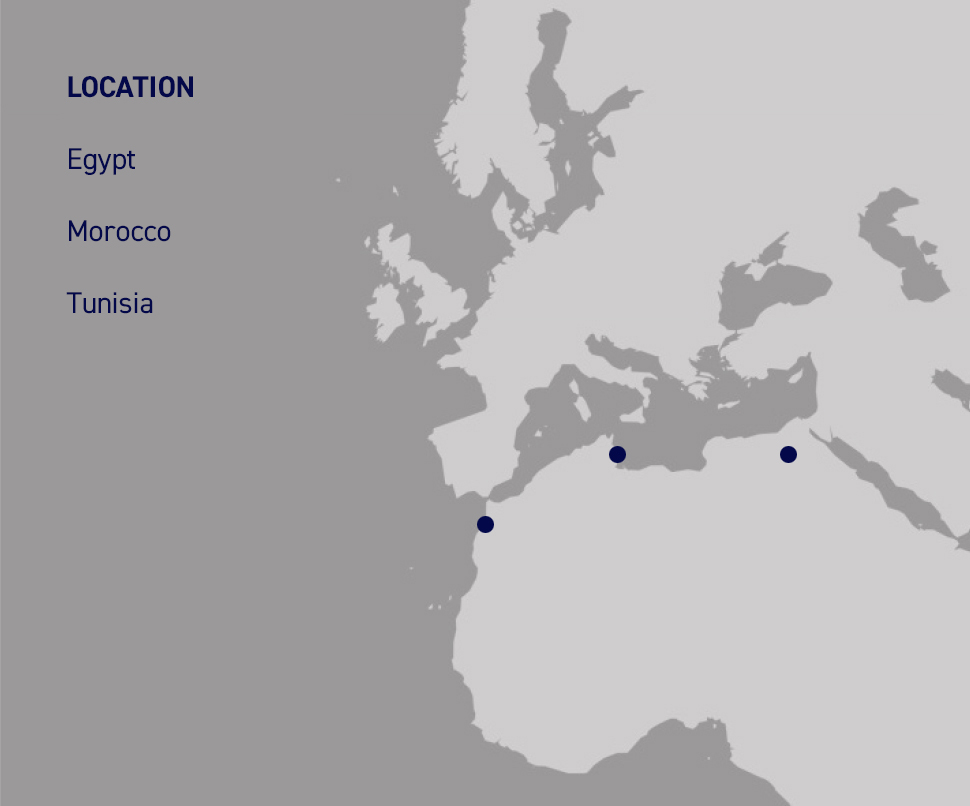
TouMaLi (Tourism Marine Litter) – Sustainable waste management systems in the tourism sector
Context and objectives
International tourism generates an estimated 4.8 million tons of solid waste annually, with single-use goods and packaging posing significant environmental challenges.
In the Mediterranean, solid waste in MENA coastal tourist destinations is a pressing issue due to high tourism pressure and their economic importance. Marine litter, including plastics, is a major concern.
The project aims to reduce tourism sector waste in Morocco, Tunisia, and Egypt, promoting recycling and reuse to decrease marine and beach litter and protect coastal ecosystems. Key activities include:
-
Preventing plastic waste production.
-
Ensuring proper waste collection and recycling.
-
Reducing plastic waste from key sources.
-
Building capacities in partner countries.
-
Decreasing plastic and microplastic pollution.
-
Preventing litter in ecologically sensitive areas.
The project supports the UfM GreenerMed Agenda and the Sustainable Blue Economy Roadmap, aligned with the UfM Ministerial Declarations on Environment and Climate Change and the Sustainable Blue Economy.
Location

Key figures
Duration:
48 months
Partners
University of Rostock
Total cost:
€ 4.231.540
Countries:
3
Financial contribution
Total budget / grant provided by the Federal Ministry for the Environment, Nature Conservation, Nuclear Safety and Consumer Protection of Germany: 4.231.539,78 EUR
Promoter
University of Rostock: The University of Rostock leads projects and establishes networks in areas related to waste management, among others. The department of waste and resource management of the University of Rostock has regional, national and international long-term experience in the fields of waste management and circular economy and supports the project through its expertise in collection, pre-treatment, and treatment of different types of waste.
Key actions
A network of all countries involved in the project will be established, consisting of decisionmakers, experts from different sectors (especially tourism industry), specialists, university professors, the private sector and students. Afterwards, this network will be expanded to become a permanent platform at the regional level.
Marine litter quantities, composition and sources will be determined and documented. The results provide an insight into major sources as well as major litter items. This serves as basis for the provision of sustainable litter management solutions and for the assessment of the success of these solutions.
Legal, institutional and technical solutions will be developed to be adopted and applied at pilot projects level in the countries involved and in line with the local conditions in each of these countries.
Training and capacity building programs will be held for the concerned staff in the field of waste management at all levels through targeted workshops.
The project framework as well as its objectives, benefits and outcomes will be disseminated locally, regionally and internationally using various media.
Several job opportunities in the tourism and recycling sector will be created by this project, in addition to organizing and improving the working conditions of the informal sector in the field of waste management.
Expected Results
Establishment of comprehensive communication and cooperation structures on national and local level. Provision of background data on the present state of pollution, waste management and recycling as well as data analysis for the entire project work.
Based on legal, institutional, financing and technical waste management concepts and under involvement of stakeholders and the industry, overall waste management and litter reduction strategies are developed for each local pilot area.
Development and implementation in the pilot areas of EPR concepts addressing at national level the products likely to end up as marine litter. By developing financial mechanisms, assigning clear roles and responsibilities and designing waste reverse chains, EPR will benefit the tourism sector.
Development and implementation of a transferable long-term citizen science marine litter beach monitoring programme, provision of beach and water pollution assessments and identification of litter sources as basis for the evaluation of the efficiency of waste reduction measures.
Development of financial and technical concepts and strategies for separated recyclable waste streams in the tourism industry, as well as their implementation in the three pilot projects in the target regions.
Dissemination of project results and provision of awareness rising and capacity building activities on marine litter and waste management in cooperation with local actors as well as activities to enable project impacts beyond the project duration and beyond the pilot areas.
